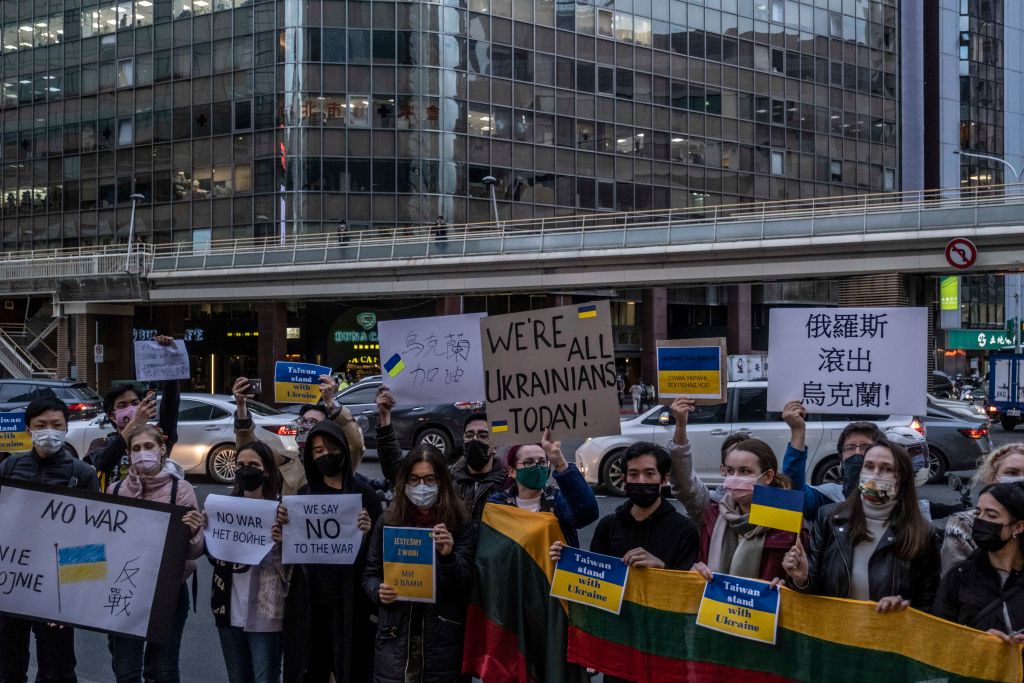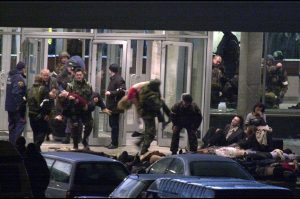No one should think that Vladimir Putin’s invasion of Ukraine means that Xi Jinping will decide to use force against Taiwan anytime soon, if ever. China is not Russia, nor Taiwan Ukraine.
Yet neither should policymakers presume that Beijing will not be influenced by what happens on the other end of Eurasia. Washington must consider whether and how Putin’s aggression has raised the stakes in defending Taiwan from the People’s Republic of China. At the least, US strategists will seriously have to assess whether a global environment in which norms of international behavior are regressing may serve to spur Beijing to military action that once seemed unlikely.
Certainly, there are important similarities between the two cases, starting with both Moscow and Beijing seeing Ukraine and Taiwan as indivisible elements of their nation-states. Each has made clear their unshakeable determination to reabsorb the “breakaway” territory, by force if necessary. Both have also sought to deny the very existence of a separate Ukrainian or Taiwanese identity, let alone their national legitimacy. Both Ukraine (despite putting up strong resistance) and Taiwan are militarily undermatched against Russia and China. Nor does Ukraine or Taiwan have any binding defensive alliances with their neighbors or other countries.
Yet differences between the two cases also abound. Whereas Ukraine is an ancient land with a history of at least a millennium, Taiwan is less than a century old. From Moscow’s perspective, over half-a-century controlling Ukraine as a Soviet republic, which ended only a generation ago, gives it special prerogatives, while the PRC has never controlled Taiwan. Moreover, while Ukraine holds numerous critical raw materials, including world-leading deposits of uranium and iron, and is the largest exporter of sunflower oil, its economic importance cannot compare to Taiwan’s position as the world’s leading producer of advanced semiconductor chips. Moreover, Russia is far less of a global economic power than is China, with commensurately less to lose.
And yet, as the specter of another age of global disorder looms, the actions Washington does or does not take in Ukraine will undoubtedly play a role in Beijing’s own calculations of how to deal with Taiwan.
Putin’s invasion of Ukraine has made clear that ambiguous indications of Western support and possible responses to military aggression, followed initially by half-hearted, limited measures, such as narrowly targeted sanctions, may serve instead to embolden aggression by regimes determined to alter the status quo. The question for such aggressor regimes is always “when,” not “whether.” At best, US policy can delay such aggression, sometimes for decades, and perhaps change the tactics used, but there is little it can do to alter a deeply held underlying national goal.
Given that, aggressors continually probe the intentions and will of their potential adversaries and their supporters. Ambiguity from Washington (and its allies) about how it would respond to active measures registers as a green light to probe further, as China discovered in the South China Sea during the 2010s. Ukraine’s initial unwillingness to mobilize in response to Russian threats sent further signals, as did the West’s continuous attempts to talk peace, which only gave Moscow time to further build up its invasion forces. Whereas the EU has stepped up in the face of initial US hesitancy, and numerous European nations have decided that Russia’s aggression must be opposed, the lack of any powerful Asian regional organization and the economic dependence of Asian nations on China, may lead Beijing to think that it would face a far less concerted response, including from America, should it move militarily on Taiwan.
While not committed legally to a defensive alliance with Taiwan, Washington has maintained support for the beleaguered island for decades, both before formal recognition of the PRC in 1979 and after. The Taiwan Relations Act and Ronald Reagan’s Six Assurances have guided US policy and ensured ongoing military aid to Taiwan, while more recently both the Trump and Biden administrations have deepened relations with Taipei. Yet fearful always of destabilizing broader US-China relations, presidents of both parties have sought to walk a fine line, restricting the sale of the most advanced weaponry, refusing to re-recognize Taipei diplomatically, and avoiding a formal defensive alliance. Above all, in the hopes of complicating Beijing’s decision-making calculus, Washington has long adopted a policy of so-called “strategic ambiguity” regarding its response to potential Chinese military action against the island.
In the aftermath of Ukraine, such strategic ambiguity in US policy may no longer be seen as complicating Beijing’s decision-making process. Rather, it may be viewed as a sophisticated way of revealing that there is no will in Washington to defend Taiwan, or if there is will, no consensus on how to do so. Opposing Russia is a far easier task, even with Putin’s nuclear saber rattling, than taking on America’s largest trade partner and the linchpin of the global economy. There has been no serious American debate over whether Taiwan, a rapidly aging society, can defend itself, or whether its military planning is adequate for meeting a Chinese invasion. More fundamentally, there is still no agreement on what “losing” Taiwan would really mean to US interests. Would Japan and South Korea actually abandon their decades-long alliances with Washington if Taiwan fell? Would China close the South China Sea to international shipping? Perhaps so, thus forcing Washington to act, but Beijing is banking on America’s long policy of avoiding direct confrontation with China to give it strategic maneuvering space.
The ways in which Washington can help defend Taiwan are narrowing, given the People’s Liberation Army buildup. The PLA is a far more technologically advanced force than the Russian army, and its ability to overwhelm 23 million Taiwanese is much greater than Russia’s (145 million population) advantage over 43.3 million Ukrainians. Increases in US sales of advanced weapons systems can help, but only if there is a Taiwanese military large enough and well trained enough to be able to make a difference. Asymmetric means of war, including disruptive cyber operations and massive drone attacks can help, but America already finds itself behind in those areas, and to help Taiwan would have to dramatically increase direct military cooperation, something Washington has not embraced.
When the PLA was a less modernized force, the luxury of strategic ambiguity made sense. Today, Xi seems far more confident in the capabilities of his armed forces, despite their lack of recent combat experience, and the outcome of a US conflict with China could be uncertain.
Every option entails risk. An aggressive, traditional defense of Taiwan would immeasurably raise the likelihood of conflict between Washington and Beijing; yet not giving Taiwan as much support as possible likely makes inevitable some kind of Chinese move (unless Xi and his successors are confident of waiting until Taiwan’s aging population makes any overt action unnecessary). Strategic ambiguity and fine line-walking may serve only to inhibit Washington, not Beijing, relegating America to watching from the sidelines.
Among other repercussions in Asia, such as the undermining of trust in the US, the fall of Taiwan more generally would see the international space inhabited by America and its allies further shrink, as in Europe. Even if Russia’s invasion fails, the hollowness of Western moral arguments about defending democracies from aggression has been revealed in the streets of Kyiv and Kharkiv. The loss of Taiwan would be another body blow to international stability and the democratic bloc.
The question is, how far can the liberal nations retreat over the coming decades before their core national interests, if not their sovereignty, are threatened?
Michael Auslin is the Payson J. Treat distinguished research fellow in Contemporary Asia at Stanford’s Hoover Institution, the author of Asia’s New Geopolitics and host of the Pacific Century podcast.

























